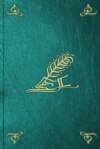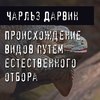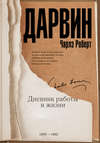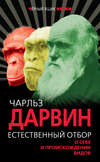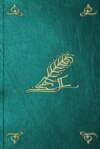Читать книгу: «More Letters of Charles Darwin — Volume 1», страница 6
LETTER 17. TO L. BLOMEFIELD {JENYNS}. Down. February 14th {1845}.
I have taken my leisure in thanking you for your last letter and discussion, to me very interesting, on the increase of species. Since your letter, I have met with a very similar view in Richardson, who states that the young are driven away by the old into unfavourable districts, and there mostly perish. When one meets with such unexpected statistical returns on the increase and decrease and proportion of deaths and births amongst mankind, and in this well-known country of ours, one ought not to be in the least surprised at one's ignorance, when, where, and how the endless increase of our robins and sparrows is checked.
Thanks for your hints about terms of "mutation," etc.; I had some suspicions that it was not quite correct, and yet I do not see my way to arrive at any better terms. It will be years before I publish, so that I shall have plenty of time to think of better words. Development would perhaps do, only it is applied to the changes of an individual during its growth. I am, however, very glad of your remark, and will ponder over it.
We are all well, wife and children three, and as flourishing as this horrid, house-confining, tempestuous weather permits.
LETTER 18. TO J.D. HOOKER. Down {1845}.
I hope you are getting on well with your lectures, and that you have enjoyed some pleasant walks during the late delightful weather. I write to tell you (as perhaps you might have had fears on the subject) that your books have arrived safely. I am exceedingly obliged to you for them, and will take great care of them; they will take me some time to read carefully.
I send to-day the corrected MS. of the first number of my "Journal" (18/1. In 1842 he had written to his sister: "Talking of money, I reaped the other day all the profit which I shall ever get from my "Journal" {"Journal of Researches, etc."} which consisted in paying Mr. Colburn 21 pounds 10 shillings for the copies which I presented to different people; 1,337 copies have been sold. This is a comfortable arrangement, is it not?" He was proved wrong in his gloomy prophecy, as the second edition was published by Mr. Murray in 1845.) in the Colonial Library, so that if you chance to know of any gross mistake in the first 214 pages (if you have my "Journal"), I should be obliged to you to tell me.
Do not answer this for form's sake; for you must be very busy. We have just had the Lyells here, and you ought to have a wife to stop your working too much, as Mrs. Lyell peremptorily stops Lyell.
LETTER 19. TO J.D. HOOKER.
(19/1. Sir J.D. Hooker's letters to Mr. Darwin seem to fix the date as 1845, while the reference to Forbes' paper indicates 1846.)
Down {1845-1846}.
I am particularly obliged for your facts about solitary islands having several species of peculiar genera; it knocks on the head some analogies of mine; the point stupidly never occurred to me to ask about. I am amused at your anathemas against variation and co.; whatever you may be pleased to say, you will never be content with simple species, "as they are." I defy you to steel your mind to technicalities, like so many of our brother naturalists. I am much pleased that I thought of sending you Forbes' article. (19/2. E. Forbes' celebrated paper "Memoirs of the Geological Survey of Great Britain," Volume I., page 336, 1846. In Lyell's "Principles," 7th Edition, 1847, page 676, he makes a temperate claim of priority, as he had already done in a private letter of October 14th, 1846, to Forbes ("Life of Sir Charles Lyell," 1881, Volume II., page 106) both as regards the Sicilian flora and the barrier effect of mountain-chains. See Letter 20 for a note on Forbes.) I confess I cannot make out the evidence of his time-notions in distribution, and I cannot help suspecting that they are rather vague. Lyell preceded Forbes in one class of speculation of this kind: for instance, in his explaining the identity of the Sicily Flora with that of South Italy, by its having been wholly upraised within the recent period; and, so I believe, with mountain-chains separating floras. I do not remember Humboldt's fact about the heath regions. Very curious the case of the broom; I can tell you something analogous on a small scale. My father, when he built his house, sowed many broom-seeds on a wild bank, which did not come up, owing, as it was thought, to much earth having been thrown over them. About thirty-five years afterwards, in cutting a terrace, all this earth was thrown up, and now the bank is one mass of broom. I see we were in some degree talking to cross-purposes; when I said I did {not} much believe in hybridising to any extent, I did not mean at all to exclude crossing. It has long been a hobby of mine to see in how many flowers such crossing is probable; it was, I believe, Knight's view, originally, that every plant must be occasionally crossed. (19/3. See an article on "The Knight-Darwin law" by Francis Darwin in "Nature," October 27th, 1898, page 630.) I find, however, plenty of difficulty in showing even a vague probability of this; especially in the Leguminosae, though their {structure?} is inimitably adapted to favour crossing, I have never yet met with but one instance of a NATURAL MONGREL (nor mule?) in this family.
I shall be particularly curious to hear some account of the appearance and origin of the Ayrshire Irish Yew. And now for the main object of my letter: it is to ask whether you would just run your eye over the proof of my Galapagos chapter (19/4. In the second edition of the "Naturalist's Voyage."), where I mention the plants, to see that I have made no blunders, or spelt any of the scientific names wrongly. As I daresay you will so far oblige me, will you let me know a few days before, when you leave Edinburgh and how long you stay at Kinnordy, so that my letter might catch you. I am not surprised at my collection from James Island differing from others, as the damp upland district (where I slept two nights) is six miles from the coast, and no naturalist except myself probably ever ascended to it. Cuming had never even heard of it. Cuming tells me that he was on Charles, James, and Albemarle Islands, and that he cannot remember from my description the Scalesia, but thinks he could if he saw a specimen. I have no idea of the origin of the distribution of the Galapagos shells, about which you ask. I presume (after Forbes' excellent remarks on the facilities by which embryo-shells are transported) that the Pacific shells have been borne thither by currents; but the currents all run the other way.
(PLATE: EDWARD FORBES 1844? From a photograph by Hill & Adamson.)
LETTER 20. EDWARD FORBES TO C. DARWIN.
(20/1. Edward Forbes was at work on his celebrated paper in the "Geological Survey Memoirs" for 1846. We have not seen the letter of Darwin's to which this is a reply, nor, indeed, any of his letters to Forbes. The date of the letter is fixed by Forbes's lecture given at the Royal Institution on February 27th, 1846 (according to L. Horner's privately printed "Memoirs," II., page 94.))
Wednesday. 3, Southwark Street, Hyde Park. {1846}.
Dear Darwin
To answer your very welcome letter, so far from being a waste of time, is a gain, for it obliges me to make myself clear and understood on matters which I have evidently put forward imperfectly and with obscurity. I have devoted the whole of this week to working and writing out the flora question, for I now feel strong enough to give my promised evening lecture on it at the Royal Institution on Friday, and, moreover, wish to get it in printable form for the Reports of our Survey. Therefore at no time can I receive or answer objections with more benefit than now. From the hurry and pressure which unfortunately attend all my movements and doings I rarely have time to spare, in preparing for publication, to do more than give brief and unsatisfactory abstracts, which I fear are often extremely obscure.
Now for your objections — which have sprung out of my own obscurities.
I do not argue in a circle about the Irish case, but treat the botanical evidence of connection and the geological as distinct. The former only I urged at Cambridge; the latter I have not yet publicly maintained.
My Cambridge argument (20/2. "On the Distribution of Endemic Plants," by E. Forbes, "Brit. Assoc. Rep." 1845 (Cambridge), page 67.) was this: That no known currents, whether of water or air, or ordinary means of transport (20/3. Darwin's note on transportation (found with Forbes' letter): "Forbes' arguments, from several Spanish plants in Ireland not being transported, not sound, because sea-currents and air ditto and migration of birds in SAME LINES. I have thought not-transportation the greatest difficulty. Now we see how many seeds every plant and tree requires to be regularly propagated in its own country, for we cannot think the great number of seeds superfluous, and therefore how small is the chance of here and there a solitary seedling being preserved in a well-stocked country."), would account for the little group of Asturian plants — few as to species, but playing a conspicuous part in the vegetation — giving a peculiar botanical character to the south of Ireland; that, as I had produced evidence of the other floras of our islands, i.e. the Germanic, the Cretaceous, and the Devonian (these terms used topographically, not geologically) having been acquired by migration over continuous land (the glacial or alpine flora I except for the present — as ice-carriage might have played a great part in its introduction) — I considered it most probable, and maintained, that the introduction of that Irish flora was also effected by the same means. I held also that the character of this flora was more southern and more ancient than that of any of the others, and that its fragmentary and limited state was probably due to the plants composing it having (from their comparative hardiness — heaths, saxifrages, etc.) survived the destroying influence of the glacial epoch.
My geological argument now is as follows: half the Mediterranean islands, or more, are partly — in some cases (as Malta) wholly — composed of the upheaved bed of the Miocene sea; so is a great part of the south of France from Bordeaux to Montpellier; so is the west of Portugal; and we find the corresponding beds with the same fossils (Pecten latissimus, etc.) in the Azores. So general an upheaval seems to me to indicate the former existence of a great post-Miocene land {in} the region of what is usually called the Mediterranean flora. (Everywhere these Miocene islands, etc., bear a flora of true type.) If this land existed, it did not extend to America, for the fossils of the Miocene of America are representative and not identical. Where, then, was the edge or coast-line of it, Atlantic-wards? Look at the form and constancy of the great fucus-bank, and consider that it is a Sargassum bank, and that the Sargassum there is in an abnormal condition, and that the species of this genus of fuci are essentially ground-growers, and then see the probability of this bank having originated on a line of ancient coast.
Now, having thus argued independently, first on my flora and second on the geological evidences of land in the quarter required, I put the two together to bear up my Irish case.
I cannot admit the Sargassum case to be parallel with that of Confervae or Oscillatoria.
I think I have evidence from the fossils of the boulder formations in Ireland that if such Miocene land existed it must have been broken up or partially broken up at the epoch of the glacial or boulder period.
All objections thankfully received.
Ever most sincerely,
EDWARD FORBES.
LETTER 21. TO L. JENYNS (BLOMEFIELD). Down. {1846}.
I am much obliged for your note and kind intended present of your volume. (21/1. No doubt the late Mr. Blomefield's "Observations in Natural History." See "Life and Letters," II., page 31.) I feel sure I shall like it, for all discussions and observations on what the world would call trifling points in Natural History always appear to me very interesting. In such foreign periodicals as I have seen, there are no such papers as White, or Waterton, or some few other naturalists in Loudon's and Charlesworth's Journal, would have written; and a great loss it has always appeared to me. I should have much liked to have met you in London, but I cannot leave home, as my wife is recovering from a rather sharp fever attack, and I am myself slaving to finish my S. American Geology (21/2. "Geological Observations in South America" (London), 1846.), of which, thanks to all Plutonic powers, two-thirds are through the press, and then I shall feel a comparatively free man. Have you any thoughts of Southampton? (21/3. The British Association met at Southampton in 1846.) I have some vague idea of going there, and should much enjoy meeting you.
LETTER 22. TO J.D. HOOKER. Shrewsbury {end of February 1846}.
I came here on account of my father's health, which has been sadly failing of late, but to my great joy he has got surprisingly better...I had not heard of your botanical appointment (22/1. Sir Joseph was appointed Botanist to the Geological Survey in 1846.), and am very glad of it, more especially as it will make you travel and give you change of work and relaxation. Will you some time have to examine the Chalk and its junction with London Clay and Greensand? If so our house would be a good central place, and my horse would be at your disposal. Could you not spin a long week out of this examination? it would in truth delight us, and you could bring your papers (like Lyell) and work at odd times. Forbes has been writing to me about his subsidence doctrines; I wish I had heard his full details, but I have expressed to him in my ignorance my objections, which rest merely on its too great hypothetical basis; I shall be curious, when I meet him, to hear what he says. He is also speculating on the gulf-weed. I confess I cannot appreciate his reasoning about his Miocene continent, but I daresay it is from want of knowledge.
You allude to the Sicily flora not being peculiar, and this being caused by its recent elevation (well established) in the main part: you will find Lyell has put forward this very clearly and well. The Apennines (which I was somewhere lately reading about) seems a very curious case.
I think Forbes ought to allude a little to Lyell's (22/2. See Letter 19.) work on nearly the same subject as his speculations; not that I mean that Forbes wishes to take the smallest credit from him or any man alive; no man, as far as I see, likes so much to give credit to others, or more soars above the petty craving for self-celebrity.
If you come to any more conclusions about polymorphism, I should be very glad to hear the result: it is delightful to have many points fermenting in one's brain, and your letters and conclusions always give one plenty of this same fermentation. I wish I could even make any return for all your facts, views, and suggestions.
LETTER 23. TO J.D. HOOKER.
(23/1. The following extract gives the germ of what developed into an interesting discussion in the "Origin" (Edition I., page 147). Darwin wrote, "I suspect also that some cases of compensation which have been advanced and likewise some other facts, may be merged under a more general principle: namely, that natural selection is continually trying to economise in every part of the organism." He speaks of the general belief of botanists in compensation, but does not quote any instances.)
{September 1846}.
Have you ever thought of G. St. Hilaire's "loi de balancement" (23/2. According to Darwin ("Variation of Animals and Plants," 2nd edition, II., page 335) the law of balancement was propounded by Goethe and Geoffroy Saint-Hilaire (1772-1844) nearly at the same time, but he gives no reference to the works of these authors. It appears, however, from his son Isidore's "Vie, Travaux etc., d'Etienne Geoffroy Saint-Hilaire," Paris 1847, page 214, that the law was given in his "Philosophie Anatomique," of which the first part was published in 1818. Darwin (ibid.) gives some instances of the law holding good in plants.), as applied to plants? I am well aware that some zoologists quite reject it, but it certainly appears to me that it often holds good with animals. You are no doubt aware of the kind of facts I refer to, such as great development of canines in the carnivora apparently causing a diminution — a compensation or balancement — in the small size of premolars, etc. I have incidentally noticed some analogous remarks on plants, but have never seen it discussed by botanists. Can you think of cases in any one species in genus, or genus in family, with certain parts extra developed, and some adjoining parts reduced? In varieties of the same species double flowers and large fruits seem something of this — want of pollen and of seeds balancing with the increased number of petals and development of fruit. I hope we shall see you here this autumn.
(24/1. In this year (1847) Darwin wrote a short review of Waterhouse's "Natural History of the Mammalia," of which the first volume had appeared. It was published in "The Annals and Magazine of Natural History," Volume XIX., page 53. The following sentence is the only one which shows even a trace of evolution: "whether we view classification as a mere contrivance to convey much information in a single word, or as something more than a memoria technica, and as connected with the laws of creation, we cannot doubt that where such important differences in the generative and cerebral systems, as distinguish the Marsupiata from the Placentata, run through two series of animals, they ought to be arranged under heads of equal value."
A characteristic remark occurs in reference to Geographical Distribution, "that noble subject of which we as yet but dimly see the full bearing."
The following letter seems to be of sufficient interest to be published in spite of the obscurities caused by the want of date. It seems to have been written after 1847, in which year a dispute involving Dr. King and several "arctic gentlemen" was carried on in the "Athenaeum." Mr. Darwin speaks of "Natural History Instructions for the present expedition." This may possibly refer to the "Admiralty Manual of Scientific Enquiry" (1849), for it is clear, from the prefatory memorandum of the Lords of the Admiralty, that they believed the manual would be of use in the forthcoming expeditions in search of Sir John Franklin.)
LETTER 24. TO E. CRESY.
(24/2. Mr. Cresy was, we believe, an architect: his friendship with Mr. Darwin dates from the settlement at Down.)
Down {after 1847}.
Although I have never particularly attended to the points in dispute between Dr. (Richard) King and the other Arctic gentlemen, yet I have carefully read all the articles in the "Athenaeum," and took from them much the same impression as you convey in your letter, for which I thank you. I believe that old sinner, Sir J. Barrow (24/3. Sir John Barrow, (1764-1848): Secretary to the Admiralty. has been at the bottom of all the money wasted over the naval expeditions. So strongly have I felt on this subject, that, when I was appointed on a committee for Nat. Hist. instructions for the present expedition, had I been able to attend I had resolved to express my opinion on the little advantage, comparatively to the expense, gained by them. There have been, I believe, from the beginning eighteen expeditions; this strikes me as monstrous, considering how little is known, for instance, on the interior of Australia. The country has paid dear for Sir John's hobbyhorse. I have very little doubt that Dr. King is quite right in the advantage of land expeditions as far as geography is concerned; and that is now the chief object. (24/4. This sentence would imply that Darwin thought it hopeless to rescue Sir J. Franklin's expedition. If so, the letter must be, at least, as late as 1850. If the eighteen expeditions mentioned above are "search expeditions," it would also bring the date of the letter to 1850.)
LETTER 25. TO RICHARD OWEN. Down {March 26th, 1848}.
My dear Owen
I do not know whether your MS. instructions are sent in; but even if they are not sent in, I daresay what I am going to write will be absolutely superfluous (25/1. The results of Mr. Darwin's experience given in the above letter were embodied by Prof. Owen in the section "On the Use of the Microscope on Board Ship," forming part of the article "Zoology" in the "Manual of Scientific Enquiry, Prepared for the Use of Her Majesty's Navy" (London, 1849).), but I have derived such infinitely great advantage from my new simple microscope, in comparison with the one which I used on board the "Beagle," and which was recommended to me by R. Brown ("Life and Letters," I., page 145.), that I cannot forego the mere chance of advantage of urging this on you. The leading point of difference consists simply in having the stage for saucers very large and fixed. Mine will hold a saucer three inches in inside diameter. I have never seen such a microscope as mine, though Chevalier's (from whose plan many points of mine are taken), of Paris, approaches it pretty closely. I fully appreciate the utter ABSURDITY of my giving you advice about means of dissecting; but I have appreciated myself the enormous disadvantage of having worked with a bad instrument, though thought a few years since the best. Please to observe that without you call especial attention to this point, those ignorant of Natural History will be sure to get one of the fiddling instruments sold in shops. If you thought fit, I would point out the differences, which, from my experience, make a useful microscope for the kind of dissection of the invertebrates which a person would be likely to attempt on board a vessel. But pray again believe that I feel the absurdity of this letter, and I write merely from the chance of yourself, possessing great skill and having worked with good instruments, {not being} possibly fully aware what an astonishing difference the kind of microscope makes for those who have not been trained in skill for dissection under water. When next I come to town (I was prevented last time by illness) I must call on you, and report, for my own satisfaction, a really (I think) curious point I have made out in my beloved barnacles. You cannot tell how much I enjoyed my talk with you here.
Ever, my dear Owen, Yours sincerely, C. DARWIN.
P.S. — If I do not hear, I shall understand that my letter is superfluous. Smith and Beck were so pleased with the simple microscope they made for me, that they have made another as a model. If you are consulted by any young naturalists, do recommend them to look at this. I really feel quite a personal gratitude to this form of microscope, and quite a hatred to my old one.
LETTER 26. TO J.S. HENSLOW. Down {April 1st, 1848.}
Thank you for your note and giving me a chance of seeing you in town; but it was out of my power to take advantage of it, for I had previously arranged to go up to London on Monday. I should have much enjoyed seeing you. Thanks also for your address (26/1. An introductory lecture delivered in March 1848 at the first meeting of a Society "for giving instructions to the working classes in Ipswich in various branches of science, and more especially in natural history" ("Memoir of the Rev. J.S. Henslow," by Leonard Jenyns, page 150.), which I like very much. The anecdote about Whewell and the tides I had utterly forgotten; I believe it is near enough to the truth. I rather demur to one sentence of yours — viz., "However delightful any scientific pursuit may be, yet, if it should be wholly unapplied, it is of no more use than building castles in the air." Would not your hearers infer from this that the practical use of each scientific discovery ought to be immediate and obvious to make it worthy of admiration? What a beautiful instance chloroform is of a discovery made from purely scientific researches, afterwards coming almost by chance into practical use! For myself I would, however, take higher ground, for I believe there exists, and I feel within me, an instinct for truth, or knowledge or discovery, of something of the same nature as the instinct of virtue, and that our having such an instinct is reason enough for scientific researches without any practical results ever ensuing from them. You will wonder what makes me run on so, but I have been working very hard for the last eighteen months on the anatomy, etc., of the Cirripedia (on which I shall publish a monograph), and some of my friends laugh at me, and I fear the study of the Cirripedia will ever remain "wholly unapplied," and yet I feel that such study is better than castle-building.
LETTER 27. TO J.D. HOOKER, at Dr. Falconer's, Botanic Garden, Calcutta. Down, May 10th, 1848.
I was indeed delighted to see your handwriting; but I felt almost sorry when I beheld how long a letter you had written. I know that you are indomitable in work, but remember how precious your time is, and do not waste it on your friends, however much pleasure you may give them. Such a letter would have cost me half-a-day's work. How capitally you seem going on! I do envy you the sight of all the glorious vegetation. I am much pleased and surprised that you have been able to observe so much in the animal world. No doubt you keep a journal, and an excellent one it will be, I am sure, when published. All these animal facts will tell capitally in it. I can quite comprehend the difficulty you mention about not knowing what is known zoologically in India; but facts observed, as you will observe them, are none the worse for reiterating. Did you see Mr. Blyth in Calcutta? He would be a capital man to tell you what is known about Indian Zoology, at least in the Vertebrata. He is a very clever, odd, wild fellow, who will never do what he could do, from not sticking to any one subject. By the way, if you should see him at any time, try not to forget to remember me very kindly to him; I liked all I saw of him. Your letter was the very one to charm me, with all its facts for my Species-book, and truly obliged I am for so kind a remembrance of me. Do not forget to make enquiries about the origin, even if only traditionally known, of any varieties of domestic quadrupeds, birds, silkworms, etc. Are there domestic bees? if so hives ought to be brought home. Of all the facts you mention, that of the wild {illegible}, when breeding with the domestic, producing offspring somewhat sterile, is the most surprising: surely they must be different species. Most zoologists would absolutely disbelieve such a statement, and consider the result as a proof that they were distinct species. I do not go so far as that, but the case seems highly improbable. Blyth has studied the Indian Ruminantia. I have been much struck about what you say of lowland plants ascending mountains, but the alpine not descending. How I do hope you will get up some mountains in Borneo; how curious the result will be! By the way, I never heard from you what affinity the Maldive flora has, which is cruel, as you tempted me by making me guess. I sometimes groan over your Indian journey, when I think over all your locked up riches. When shall I see a memoir on Insular floras, and on the Pacific? What a grand subject Alpine floras of the world (27/1. Mr. William Botting Hemsley, F.R.S., of the Royal Gardens, Kew, is now engaged on a monograph of the high-level Alpine plants of the world.) would be, as far as known; and then you have never given a coup d'oeil on the similarity and dissimilarity of Arctic and Antarctic floras. Well, thank heavens, when you do come back you will be nolens volens a fixture. I am particularly glad you have been at the Coal; I have often since you went gone on maundering on the subject, and I shall never rest easy in Down churchyard without the problem be solved by some one before I die. Talking of dying makes me tell you that my confounded stomach is much the same; indeed, of late has been rather worse, but for the last year, I think, I have been able to do more work. I have done nothing besides the barnacles, except, indeed, a little theoretical paper on erratic boulders (27/2. "On the Transportal of Erratic Boulders from a Lower to a Higher Level" ("Quart. Journ. Geol. Soc." Volume IV., pages 315-23. 1848). In this paper Darwin favours the view that the transport of boulders was effected by coast-ice. An earlier paper entitled "Notes on the Effects produced by the ancient Glaciers of Caernarvonshire, and on the Boulders transported by floating Ice" ("Phil. Mag." 1842, page 352) is spoken of by Sir Archibald Geikie as standing "almost at the top of the long list of English contributions to the history of the Ice Age" ("Charles Darwin," "Nature" Series, page 23).), and Scientific Geological Instructions for the Admiralty Volume (27/3. "A manual of Scientific Enquiry, prepared for the use of Her Majesty's Navy, and adapted for Travellers in General." Edited by Sir John F.W. Herschel, Bart. Section VI. — Geology — by Charles Darwin. London, 1849. See "Life and Letters," pages 328-9.), which cost me some trouble. This work, which is edited by Sir J. Herschel, is a very good job, inasmuch as the captains of men-of-war will now see that the Admiralty cares for science, and so will favour naturalists on board. As for a man who is not scientific by nature, I do not believe instructions will do him any good; and if he be scientific and good for anything the instructions will be superfluous. I do not know who does the Botany; Owen does the Zoology, and I have sent him an account of my new simple microscope, which I consider perfect, even better than yours by Chevalier. N.B. I have got a 1/8 inch object-glass, and it is grand. I have been getting on well with my beloved Cirripedia, and get more skilful in dissection. I have worked out the nervous system pretty well in several genera, and made out their ears and nostrils (27/4. For the olfactory sacs see Darwin's "Monograph of the Cirripedia," 1851, page 52.), which were quite unknown. I have lately got a bisexual cirripede, the male being microscopically small and parasitic within the sack of the female. I tell you this to boast of my species theory, for the nearest closely allied genus to it is, as usual, hermaphrodite, but I had observed some minute parasites adhering to it, and these parasites I now can show are supplemental males, the male organs in the hermaphrodite being unusually small, though perfect and containing zoosperms: so we have almost a polygamous animal, simple females alone being wanting. I never should have made this out, had not my species theory convinced me, that an hermaphrodite species must pass into a bisexual species by insensibly small stages; and here we have it, for the male organs in the hermaphrodite are beginning to fail, and independent males ready formed. But I can hardly explain what I mean, and you will perhaps wish my barnacles and species theory al Diavolo together. But I don't care what you say, my species theory is all gospel. We have had only one party here: viz., of the Lyells, Forbes, Owen, and Ramsay, and we both missed you and Falconer very much...I know more of your history than you will suppose, for Miss Henslow most good-naturedly sent me a packet of your letters, and she wrote me so nice a little note that it made me quite proud. I have not heard of anything in the scientific line which would interest you. Sir H. De la Beche (27/5. The Presidential Address delivered by De la Beche before the Geological Society in 1848 ("Quart. Journ. Geol. Soc." Volume IV., "Proceedings," page xxi, 1848).) gave a very long and rather dull address; the most interesting part was from Sir J. Ross. Mr. Beete Jukes figured in it very prominently: it really is a very nice quality in Sir Henry, the manner in which he pushes forward his subordinates. Jukes has since read what was considered a very valuable paper. The man, not content with moustaches, now sports an entire beard, and I am sure thinks himself like Jupiter tonans. There was a short time since a not very creditable discussion at a meeting of the Royal Society, where Owen fell foul of Mantell with fury and contempt about belemnites. What wretched doings come from the order of fame; the love of truth alone would never make one man attack another bitterly. My paper is full, so I must wish you with all my heart farewell. Heaven grant that your health may keep good.
Покупайте книги и получайте бонусы в Литрес, Читай-городе и Буквоеде.
Участвовать в бонусной программе












